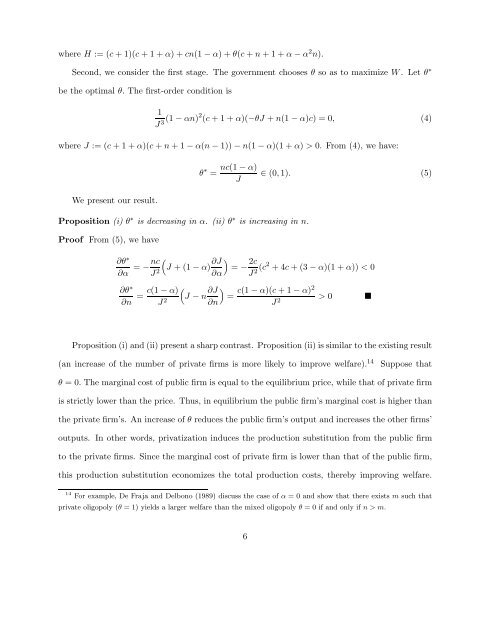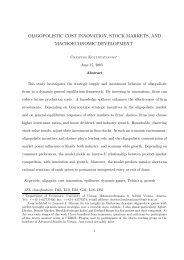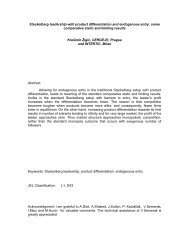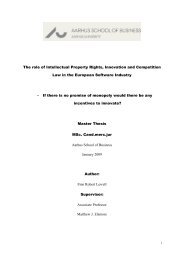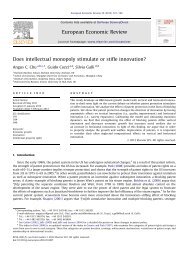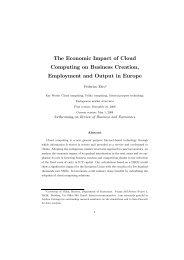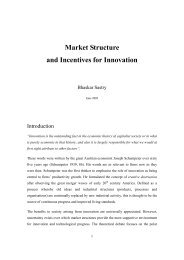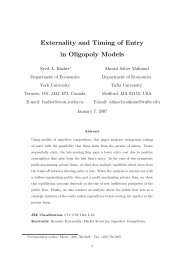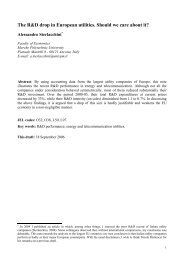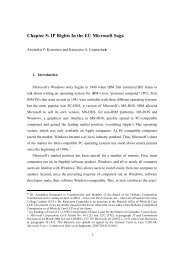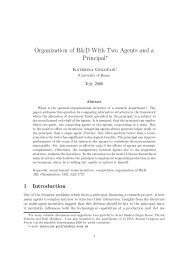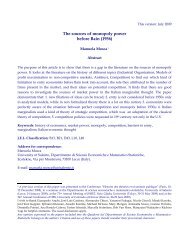PDF File - Institute of Social Science
PDF File - Institute of Social Science
PDF File - Institute of Social Science
You also want an ePaper? Increase the reach of your titles
YUMPU automatically turns print PDFs into web optimized ePapers that Google loves.
where H := (c + 1)(c +1+α)+cn(1 − α)+θ(c + n +1+α − α 2 n).<br />
Second, we consider the first stage. The government chooses θ so as to maximize W . Let θ ∗<br />
be the optimal θ. The first-order condition is<br />
1<br />
J 3 (1 − αn)2 (c +1+α)(−θJ + n(1 − α)c) =0, (4)<br />
where J := (c +1+α)(c + n +1− α(n − 1)) − n(1 − α)(1 + α) > 0. From (4), we have:<br />
θ ∗ =<br />
nc(1 − α)<br />
J<br />
∈ (0, 1). (5)<br />
We present our result.<br />
Proposition (i) θ ∗ is decreasing in α. (ii) θ ∗ is increasing in n.<br />
Pro<strong>of</strong> From (5), we have<br />
∂θ ∗<br />
∂α = − nc (<br />
J 2 J +(1− α) ∂J )<br />
∂α<br />
∂θ ∗<br />
∂n<br />
c(1 − α)<br />
(<br />
=<br />
J 2 J − n ∂J<br />
∂n<br />
)<br />
=<br />
= − 2c<br />
J 2 (c2 +4c +(3− α)(1 + α)) < 0<br />
c(1 − α)(c +1− α)2<br />
J 2 > 0 <br />
Proposition (i) and (ii) present a sharp contrast. Proposition (ii) is similar to the existing result<br />
(an increase <strong>of</strong> the number <strong>of</strong> private firms is more likely to improve welfare). 14<br />
Suppose that<br />
θ =0. The marginal cost <strong>of</strong> public firm is equal to the equilibrium price, while that <strong>of</strong> private firm<br />
is strictly lower than the price. Thus, in equilibrium the public firm’s marginal cost is higher than<br />
the private firm’s. An increase <strong>of</strong> θ reduces the public firm’s output and increases the other firms’<br />
outputs. In other words, privatization induces the production substitution from the public firm<br />
to the private firms. Since the marginal cost <strong>of</strong> private firm is lower than that <strong>of</strong> the public firm,<br />
this production substitution economizes the total production costs, thereby improving welfare.<br />
14 For example, De Fraja and Delbono (1989) discuss the case <strong>of</strong> α = 0 and show that there exists m such that<br />
private oligopoly (θ = 1) yields a larger welfare than the mixed oligopoly θ = 0 if and only if n>m.<br />
6


